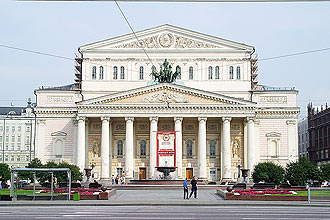 |
The company of the Bolshoi was originally founded in 1776 by Prince Peter Urusov and English impresario Michael Maddox as the Moscow Public Theatre. Maddox became the sole owner in 1780, and a building was constructed for the company on Petrovskaya (now Teatralnaya) Square, on the site of the present theatre. Fire destroyed the building in 1805, ruining Maddox and bringing the theatre under Sate control, to be renamed the Imperial Theatre.
The company was briefly housed in a wooden building on Great Arbat Square, but this also succumbed to fire during Napoleon's invasion of 1812, and in 1824 Petrovskaya Square was rebuilt in the Classical style, with a new building for the theatre designed by Osip Bove. At the time it was second only to La Scala in size, with a 2,200-seat auditorium.
Fire struck again in 1853, once more destroying the theatre, but this time it only took three years before the present building was constructed by architect Albert Kavos, based on Bove's plans. It was reopened to coincide with the coronation of Aleksander II, in August 1856.
At the start of its life, the Moscow Imperial Theatre was something of a provincial cousin to its St Petersburg counterparts, but the arrival in the 1890s of the great choreographer Alexander Gorsky and, soon after, of such legendary singers as Fyodor Chaliapin, Leonid Sobinov, and Antonina Nezhdanova boosted its fortunes. Amongst other pre-revolutionary stars, Sergei Rachmaninov was the principle conductor from 1904-06.
After the Revolution, the theatre initially faced hostility from the Bolsheviks as a superfluous symbol of elitist bourgeois culture, and funding was cut dramatically. But traditions survived and, after the Second World War, the Bolshoi became a dominant force in ballet not just in Russia but throughout the world, producing star after star including ballerinas Galina Ulanova, Maria Plisetskaya, and Ekaterina Maksimovna, and male dancers such as Vladimir Vasiliev and Maris Liepa.
The collapse of the Soviet Union brought the Bolshoi the same headaches that the 1917 Revolution had. Funding was drastically slashed and all but the most die-hard fans lost interest. The 1990's witnessed a slump in fortunes, with many of the company's stars forced to find more lucrative work in the West. Productions were characterized by a stifling lack of innovation or direction. However, things are looking up, with a number of internationally praised recent productions and an energetic new Artistic Director for Ballet, Aleksei Ratmansky. Once the reconstruction, restoring the originally famed acoustics of the main theatre is complete, the hopes are that the Bolshoi will be back at the centre of the world stage.
|
 |

 Although in recent years the Bolshoi has been beset by financial and artistic difficulties, and somewhat overshadowed by the remarkable resurgence of St Petersburg's Kirov, it is still one of the greatest theatres in the world, with its own proud traditions and unforgettable atmosphere. An evening at the Bolshoi really is an essential part of a visit to Moscow.
Although in recent years the Bolshoi has been beset by financial and artistic difficulties, and somewhat overshadowed by the remarkable resurgence of St Petersburg's Kirov, it is still one of the greatest theatres in the world, with its own proud traditions and unforgettable atmosphere. An evening at the Bolshoi really is an essential part of a visit to Moscow.